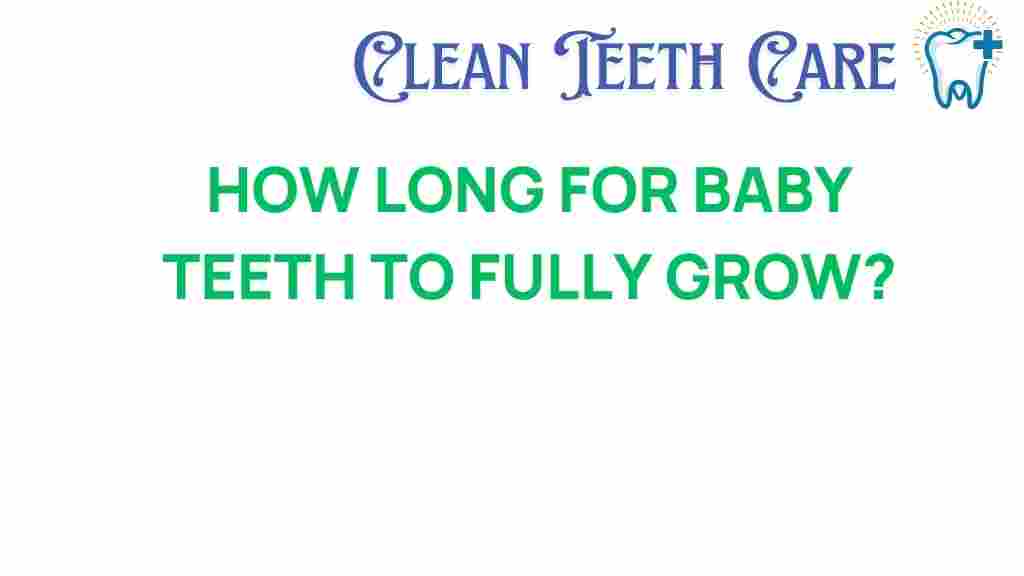Unraveling the Mystery: How Long Do Baby Teeth Take to Grow?
As new parents, understanding the teething timeline and the overall dental development of your baby is essential. Baby teeth, also known as primary teeth, play a vital role in a child’s ability to chew, speak, and maintain proper oral health as they grow. In this comprehensive guide, we will explore the milestones of tooth eruption, what to expect during this exciting phase, and how to ensure your infant’s dental health is on track.
The Importance of Baby Teeth
Baby teeth serve several critical functions in a child’s early life:
- Facilitating Eating: They enable infants to chew food, which is crucial for proper nutrition.
- Speech Development: Baby teeth aid in the formation of sounds and words.
- Saving Space for Permanent Teeth: They help guide the permanent teeth into their correct positions.
- Boosting Confidence: A healthy smile contributes to a child’s self-esteem.
Teething Timeline: What to Expect
The teething process can be unpredictable and varies greatly among children. On average, the baby teeth begin to erupt between the ages of 6 months and 1 year. Here is a typical teething timeline:
- 6-10 Months: Central incisors (two bottom front teeth) usually erupt first.
- 8-12 Months: Central incisors (top two front teeth) follow.
- 9-13 Months: Lateral incisors (side teeth on the upper and lower gums) emerge next.
- 13-19 Months: First molars (back teeth used for grinding) appear.
- 16-22 Months: Canines (sharp teeth next to the lateral incisors) erupt.
- 25-33 Months: Second molars (the back teeth) complete the set of baby teeth.
By the age of 3, most children will have a complete set of 20 baby teeth. Understanding this teething timeline can help you prepare for the changes your baby will experience.
Signs and Symptoms of Teething
As your baby’s teeth begin to erupt, you may notice several signs and symptoms indicating that they are teething:
- Increased drooling
- Chewing on objects or fingers
- Irritability or fussiness
- Swollen or tender gums
- Decreased appetite due to discomfort
While teething can be uncomfortable for babies, it’s important to note that severe symptoms, such as high fever or diarrhea, are not typical and may require consultation with a pediatrician.
Tips for Easing Teething Discomfort
To help ease your baby’s discomfort during teething, consider the following tips:
- Cold Compress: Gently rub a cold washcloth on your baby’s gums.
- Teething Toys: Provide a safe teething ring or soft toy for them to chew on.
- Massage Gums: Use a clean finger to massage your baby’s gums gently.
- Medication: Consult your pediatrician regarding appropriate pain relief options, such as acetaminophen.
Dental Development Milestones
Monitoring your child’s dental development is crucial for ensuring good oral health. Here are some key milestones to watch for:
- First Tooth: Typically appears by 6 months.
- First Dental Visit: Recommended around the child’s first birthday or within 6 months of the first tooth.
- Transition to Adult Teeth: Begins around age 6, when the first permanent molars appear.
Early visits to a pediatric dentist can help establish a foundation for lifelong oral health. Pediatric dentistry focuses on the unique dental needs of children, ensuring they receive appropriate care tailored to their developmental stage.
Common Concerns During Tooth Eruption
As parents, you may encounter various concerns during your baby’s teething phase. Here are some common issues and their solutions:
1. Delay in Tooth Eruption
Some children may experience delays in tooth eruption. If your child hasn’t developed any teeth by 12 months, consult your pediatrician or a pediatric dentist for guidance.
2. Baby Teeth Falling Out Early
It’s normal for baby teeth to start falling out around age 6. However, if a baby tooth falls out too early, it can affect the alignment of permanent teeth. Speak to a dentist for advice.
3. Cavities in Baby Teeth
Even though they are temporary, baby teeth can develop cavities. It’s essential to maintain good oral hygiene from an early age. Brush your child’s teeth with a fluoride toothpaste as soon as they emerge.
Oral Health Tips for Infants
Good oral hygiene should start as soon as your baby’s first tooth appears. Here are some infant care tips to ensure healthy dental development:
- Wipe Gums: Before your baby has teeth, wipe their gums with a clean, damp cloth after feeding.
- Introduce a Toothbrush: Use a soft-bristled toothbrush and a tiny smear of fluoride toothpaste once the first tooth erupts.
- Avoid Sugary Drinks: Limit sugary beverages and snacks to prevent cavities.
- Regular Check-ups: Schedule dental visits as recommended to monitor oral health and development.
Conclusion
Understanding how long baby teeth take to grow and the teething timeline can help you navigate this important phase of your child’s life. From recognizing the signs of teething to ensuring proper dental development, being informed will empower you as a parent. Remember that pediatric dentistry plays a crucial role in your child’s overall health, so don’t hesitate to reach out to a professional for guidance.
By following the tips provided in this guide, you can support your baby’s oral health and make the teething process a little easier. Keep in mind that every child is different, and while some may breeze through teething, others may need more support. If you have specific concerns about your child’s dental health, be sure to consult with your pediatrician or a pediatric dentist.
For more information on infant care and dental development, visit our parent guide for helpful resources and tips.
This article is in the category Kids and created by CleanTeethCare Team
